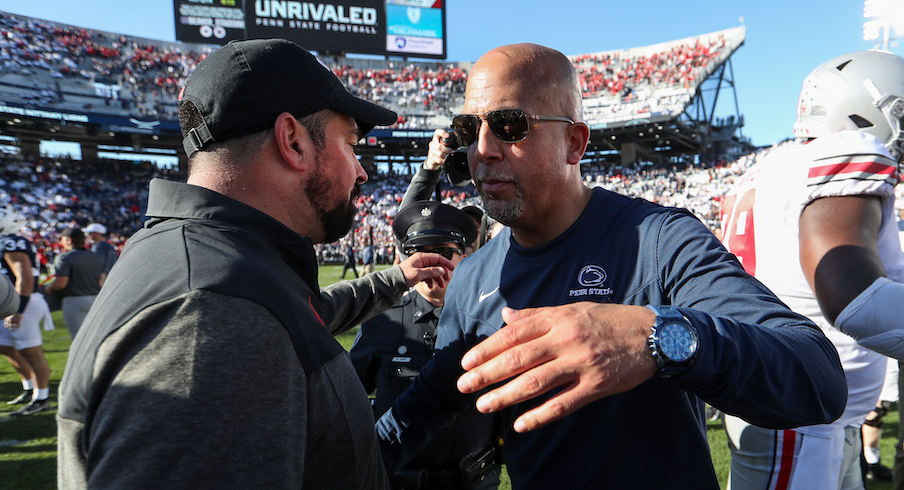During his interview session at Big Ten Media Days on Wednesday, I asked Penn State coach James Franklin if he considers Ohio State and Penn State to be rivals.
To Franklin, the fact that I had reason to ask that question was evidence enough that Ohio State vs. Penn State is not a true rivalry.
“I kind of look at those teams in our conference as really good teams that we've competed with for a long time and have had great games. To me, that word is different,” Franklin said. “I think there seems to be a lot of people trying to create those things … to me, there shouldn't have to be discussions on if this team is a rival or not. If they're a rival, everybody knows they are, in my opinion.”
When the Big Ten announced its list of protected rivalry games for its new scheduling model that will begin next year, Ohio State vs. Penn State was the most notable omission. Ohio State will have just one opponent that it plays every year going forward – its undisputed rival, Michigan – while Penn State is the lone team in the conference without any protected rivals.
The Buckeyes and Nittany Lions have played each other every year since Penn State joined the Big Ten in 1993, and the annual meeting between the flagship schools from neighboring states has become one of the conference’s most anticipated matchups each year. Both programs have consistently ranked among the Big Ten’s top football teams, making it a game that both fanbases circle on their calendars each year.
But as the Big Ten prepares to go divisionless with the impending additions of USC and UCLA next year, neither side seems to be lamenting that Ohio State and Penn State are only scheduled to play each other once every two years instead of every single year.
Ryan Day referred to the matchup as a rivalry and said he believes it is a good thing for college football when the Buckeyes and Nittany Lions play each other, but he also admitted he won’t be losing sleep over not having to play Penn State every year, even though he is 4-0 against the Nittany Lions as a head coach.
“You know, it doesn't really matter at this point. The decision’s been made,” Day said. “We like playing Penn State. They’re a great team. And it's one of those games where you find out where you're at year in and year out. Do I like playing them? I mean, not really, ‘cause they're a very good team. But at the same time, I think the rivalry has been excellent. I think it's good for college football to see Penn State, Ohio State play.”
Ohio State athletic director Gene Smith offered a similar reason to Franklin when he was asked about no longer playing Penn State every year. Following the reveal of the Big Ten’s new scheduling model, Smith described Penn State as a “competitive rivalry,” making the distinction between that matchup and the longstanding tradition of Ohio State playing Michigan every year, which dates back to 1918.
“Penn State had developed into a competitive rivalry for us. Unlike the other 11 protected games in this model, where you have some history and tradition around those competitions, you look at the three that Iowa protected or that Illinois protected or the fact that we protected Michigan, those are historical rivalries. Deep-rooted rivalries. And the Penn State rivalry for us was a competitive rivalry,” Smith said on Big Ten Network in June. “And so in order to meet the balance of trying to make sure that every team, every school had an opportunity over a four-year period to play at every place at least twice, you had to sacrifice some things.”
“To me, there shouldn't have to be discussions on if this team is a rival or not. If they're a rival, everybody knows they are, in my opinion.”– James Franklin on why he doesn’t see Ohio State as a true rival
The annual Ohio State vs. Penn State game is certainly one that has been looked forward to by many players on both sides, including Ohio State wide receiver Marvin Harrison Jr., who enjoys playing against his home-state school as a Philadelphia native.
“I love playing at Penn State,” Harrison said. “That was a special game (last year). I had that one circled on my calendar for a while, going into last year, to go back to play at Penn State. And that was a special game for me.”
That said, Penn State’s player representatives at Big Ten Media Days – left tackle Olu Fashanu, defensive end Adisa Isaac and safety Keaton Ellis – all seemed unbothered that Penn State won’t have any protected rivals in the new scheduling model, with each of them saying that they treat every opponent the same.
“I mean, I feel like everybody should be a rival,” Isaac said. “You shouldn't overlook anybody. That's how I look at it. So I mean, when it comes to rivals and stuff, yeah, it's cool. You compete with top teams, but it should be every game should be a Super Bowl for you.”
Penn State has used “Unrivaled” as a marketing slogan for its program for years, and PSU is likely to lean into that marketing even more now that it won’t have any team on its schedule that it plays every single season.
“I kind of look at those teams in our conference as really good teams that we've competed with for a long time and have had great games,” Franklin said. “We're not an original Big Ten team, we were independent for a long time. Then you join a conference, and then people try to create rivalries that really weren't there.”
Both teams can see competitive benefits in not having to play each other every year, which is the biggest reason why their game isn’t among the protected rivalries. Considering that Ohio State, Michigan and Penn State have been three of the top teams in the Big Ten for the past decade, Ohio State would likely face a competitive disadvantage in a divisionless Big Ten if it had to play both Michigan and Penn State every year. Penn State has beaten Ohio State just once in the past 11 years, so playing the Buckeyes annually certainly hasn’t helped the Nittany Lions’ chances of making the Big Ten Championship Game.
With the College Football Playoff set to expand to 12 teams in 2024, the Big Ten sought to create a scheduling model that would elevate its chances of getting as many of its teams as possible into the CFP every year. While Day and Franklin weren’t necessarily advocating for Ohio State and Penn State to no longer play each other every year – and one could argue that playing each other every year means one more chance to beef up their respective playoff résumés with a win over a marquee opponent – both of them complimented the conference for creating a scheduling model they believe will work toward the goal of getting multiple Big Ten teams in the playoff each season.
“I think they did the best they could to try to put that all together. I know that one of the goals was to try to get as many teams as possible in the playoffs,” Day said. “So when you're looking at that, you want to have certain teams you play on a yearly basis, but at the same time, you also want to try to do the best you can to get as many guys into the playoffs.”
Franklin said he thinks “the Big Ten has made some decisions that I think most people would agree, whether it's athletic directors or coaches, that we made decisions that we felt like were going to put the conference in the best position to compete for national championships and not only that, give us the best chance to get multiple teams into the playoffs.”
“I think you have to kind of really build it and look at it from that way, and I think our conference has made some decisions to do that,” Franklin said. “Obviously with any decision you make, there's going to be some give and take. There's going to be some things that are gained, and there's going to be some things that are lost. But I think for the most part, the benefits will outweigh those things.”


